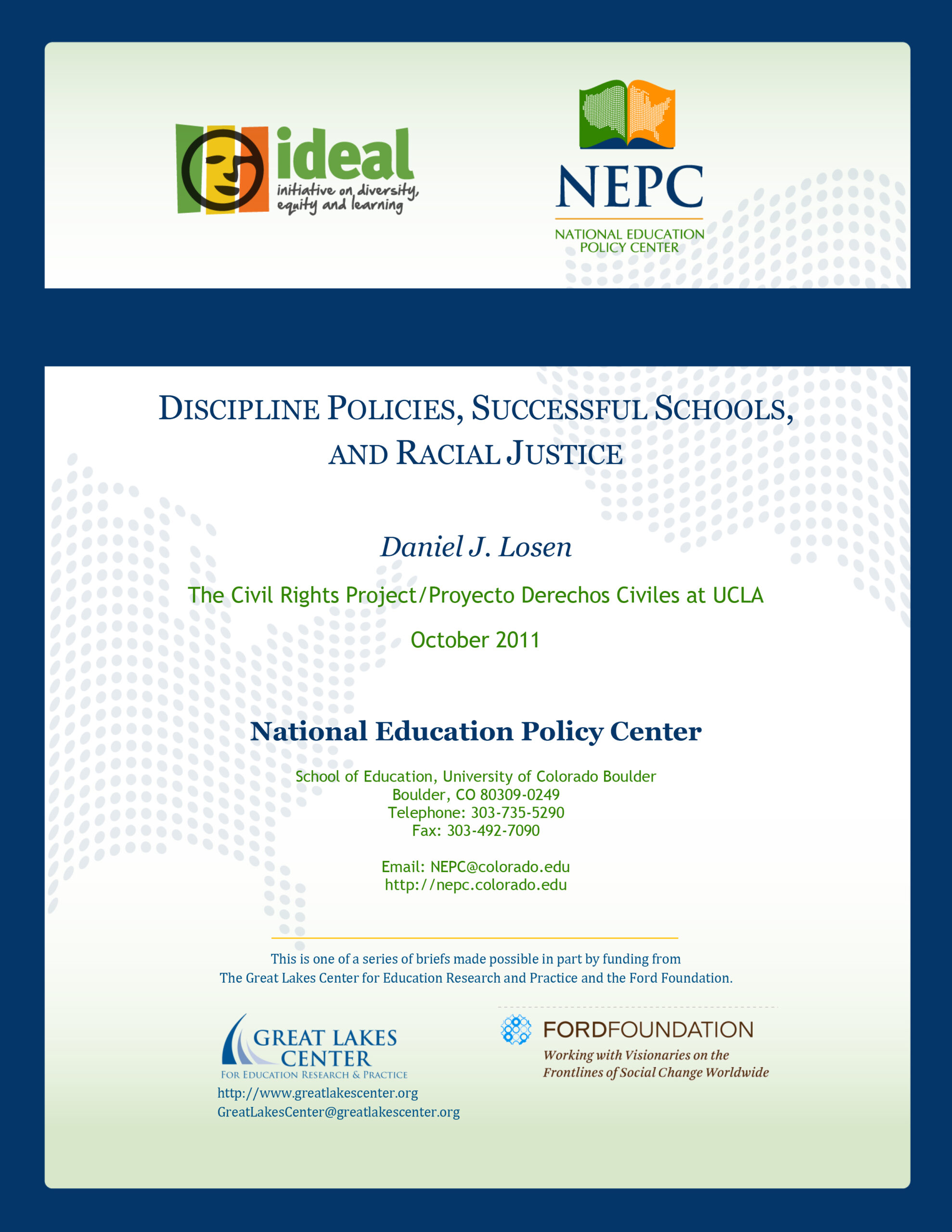Executive Summary
In March of 2010, Secretary of Education Arne Duncan delivered a speech that highlighted racial disparities in school suspension and expulsion and that called for more rigorous civil rights enforcement in education. He suggested that students with disabilities and Black students, especially males, were suspended far more often than their White counterparts. These students, he also noted, were often punished more severely for similar misdeeds. Just months later, in September of 2010, a report analyzing 2006 data collected by the U.S. Department of Education’s Office for Civil Rights found that more than 28% of Black male middle school students had been suspended at least once. This is nearly three times the 10% rate for white males. Further, 18% of Black females in middle school were suspended, more than four times as often as white females (4%). Later that same month, U.S. Attorney General Eric Holder and Secretary Duncan each addressed a conference of civil rights lawyers in Washington, D.C., and affirmed their departments’ commitment to ending such disparities.
This policy brief reviews what researchers have learned about racial disparities in school discipline, including trends over time and how these disparities further break down along lines of gender and disability status. Further, the brief explores the impact that school suspension has on children and their families, including the possibility that frequent out-of-school suspension may have a harmful and racially disparate impact. As part of the disparate impact analysis, the brief examines whether frequent disciplinary exclusion from school is educationally justifiable and whether other discipline policies and practices might better promote a safe and orderly learning environment while generating significantly less racial disparity.
Findings of this brief strongly suggest a need for reform. A review of the evidence suggests that subgroups experiencing disproportionate suspension miss important instructional time and are at greater risk of disengagement and diminished educational opportunities. Moreover, despite the fact that suspension is a predictor of students’ risk for dropping out, school personnel are not required to report or evaluate the impact of disciplinary decisions. Overall, the evidence shows the following: there is no research base to support frequent suspension or expulsion in response to non-violent and mundane forms of adolescent misbehavior; large disparities by race, gender and disability status are evident in the use of these punishments; frequent suspension and expulsion are associated with negative outcomes; and better alternatives are available.
Based on the research reviewed, the following recommendations for improved policies and practices will help safeguard the civil rights of our schoolchildren and create more effective and equitable learning environments:
- Public school educators should routinely collect, reflect upon, and publicly report data on school disciplinary removal. Reports at the state, district, and school level (where permissible) should include data disaggregated by race/ethnicity, gender, and disability status in terms of numbers of each group disciplined. These reports should also include the percentage of each group that experiences suspension and expulsion, as well as disaggregated incidence data on the type of infraction and the number of days of missed instruction that results from such removals.
- Civil rights enforcement agents should use the disparate impact standard of legal review as grounds to pursue remedies for the unjust and unnecessary removal of children from school.
- When Congress reauthorizes the Elementary and Secondary Education Act and the Individuals with Disabilities Education Act, it should provide positive incentives for schools, districts and states to support students, teachers and school leaders in systemic improvements to classroom and behavior management where rates of disciplinary exclusion are high – even where disparities do not suggest unlawful discrimination.
- Federal and state policy should specify the rate of out-of-school suspensions as one of several factors to be considered in assessments of school efficacy, especially for low-performing schools.
- Researchers should investigate connections between school discipline data and key outcomes such as achievement, graduation rates, teacher effectiveness, and college and career readiness.
- System-wide improvements should be pursued through better policies and practices at all levels—including an effort to improve teachers’ skills in classroom and behavior management.
Our public schools are essential to preparing our children to participate fully in our economic and democratic future. With these interests at stake, U.S. policymakers must find more effective ways to educate all of the nation’s children, including those who may be challenging to engage.
In compliance with the UC Open Access Policy, this report has been made available on eScholarship:
